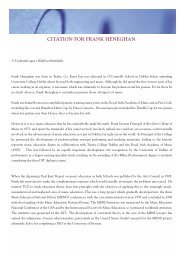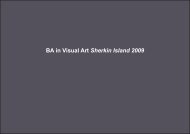TWICE THE SIZE - DIT Update - Dublin Institute of Technology
TWICE THE SIZE - DIT Update - Dublin Institute of Technology
TWICE THE SIZE - DIT Update - Dublin Institute of Technology
Create successful ePaper yourself
Turn your PDF publications into a flip-book with our unique Google optimized e-Paper software.
Global<br />
It is a “market world” in 2030, where the American model <strong>of</strong> capitalism has finally achieved<br />
global dominance, having weathered the international financial maelstrom <strong>of</strong> 2009 and the<br />
storms <strong>of</strong> ‘Chindian’ protectionism and market-dumping during the period 2010 to 2020. An<br />
extended economic boom during the 2020’s has shown that free market policies, corporate<br />
restructuring and enlightened entrepreneurship <strong>of</strong>fer a paradigm for growth leading to increased<br />
global market integration, unprecedented technological innovation, pressure for independence<br />
<strong>of</strong> thought and action, and rising standards <strong>of</strong> literacy in most parts <strong>of</strong> the world.<br />
Free market reforms have moved governments everywhere to downsize, deregulate and<br />
privatise. The pace <strong>of</strong> innovation breeds new opportunities at astonishing speed. The thesis<br />
throughout is: let markets work, turn loose the private sector, breakdown the barriers to free<br />
trade, and all will be well. Sooner or later, rapid economic growth and increasing prosperity<br />
will happen or ‘trickle down’ in virtually every region <strong>of</strong> the earth. The rising tide floats all<br />
boats.<br />
In this world <strong>of</strong> ‘Liberty’ diverse players join-in ad hoc alliances to solve social and<br />
environmental problems in the most pragmatic way possible. The keynote <strong>of</strong> this scenario is<br />
‘dynamic reciprocity’ – giving and taking in a climate that is closely attuned to the opportunities<br />
<strong>of</strong> the moment whilst, at the same time, alert to ways <strong>of</strong> incorporating long-term values into<br />
strategies for commercial success. This is a world <strong>of</strong> social and technological innovations,<br />
experimentation, rapid adaptation, much voluntary interconnectedness, fierce competition, and<br />
a powerful, ever-changing global market. Transparency in everything is high, and the<br />
widespread availability <strong>of</strong> information allows free market entry to new actors.<br />
The growing connectivity <strong>of</strong> national economies and transnational business, however, does not<br />
occur smoothly. Multiple players with varying values and differing objectives vie for power and<br />
position in a global milieu <strong>of</strong> swiftly shifting, fluid alliances. What role environmental<br />
regulations and social welfare should play is a constant source <strong>of</strong> dispute. The arguments are<br />
intensified by the increased interest <strong>of</strong> media in reporting on environmental degradation and<br />
social inequity, especially the growing gap between rich and poor countries. Accelerating<br />
migration from the poorer parts <strong>of</strong> less developed countries and regions, moreover, is seen as a<br />
serious threat by many in the more developed regions <strong>of</strong> the world.<br />
Europe<br />
For Europe, this is a world that has witnessed the “triumph <strong>of</strong> trade over war”. Europe in 2030<br />
has largely been shaped by constant economic growth driven by the continuing processes <strong>of</strong><br />
globalisation, privatisation and the liberalisation <strong>of</strong> key markets, including technology, energy,<br />
air transport, pharmaceuticals, and financial services. E-commerce has become embedded in<br />
the fabric <strong>of</strong> European business, with explosive developments in mobile communications, shortrange<br />
wireless, digital intelligence, and voice and language technologies. Europe has become a<br />
101








